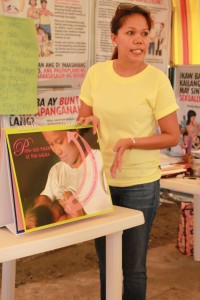
Roxas City, Capiz – After Typhoon Yolanda, the usual scenario in Barangay Punta Cogon in this city shows women playing tong its, bingo, and bog-oy which are forms of gambling.
Since last month, however, most of them have stopped engaging in these card and number games.
Thanks to the newly established Women-Friendly Spaces (WFS) in the barangay, the women are now engaged in more productive endeavors.
“Instead of gambling, they are now attending sessions at the WFS,” Susana Bornales, a Day Care Worker and WFS facilitator, said.
Facility for women
The WFS is a facility that addresses the specific needs of women affected by disasters and provides a more systematic, organized, and gender-responsive way of delivering services to them.
It is setup at evacuation camps, transitional sites, or in disaster-affected communities.
The Department of Social Welfare and Development (DSWD), United Nations Population Fund (UNFPA), the city local government, and other concerned international organizations partnered to organize this vital facility.
In Punta Cogon, nearly 300 women are availing of services provided at the WFS.
These include lectures on disaster preparedness and on what to do during and after a disaster. Breastfeeding techniques, parenting responsibilities, and women’s rights are also discussed. Likewise, skills coaching on dressmaking and craftsmanship is conducted.
Bornales also noted that the setting-up of WFS has also resulted to lesser husband and wife conflicts.
“When men heard of their wives talking that there are laws protecting them, some men who had violent tendencies were careful not to hurt their wives,” said Bornales.
Aside from the activities, the woman-beneficiaries are also provided with basic kits containing flashlights, whistles, brassieres, underwear, and sanitary napkins.
Disaster Response
Recognizing the importance of WFS as a disaster response strategy, DSWD has enlisted the assistance of the International Rescue Committee (IRC) and the UNFPA to further capacitate its social workers in implementing this.
A training was then recently organized for social workers on how to establish a WFS.
DSWD Social Worker Rebecca Geamala also explained that woman and girl-victims of disasters should have their special place to prevent them from being abused and exploited.
“Mixed population in evacuation centers leave the women and girls prone and vulnerable to abuse because they live together in one roof,” Geamala said.
Geamala also cited that, in times of disasters, breastfeeding sites take weeks before they are put up, thus, lactating mothers do not have the privacy when they breastfeed their babies.
Geamala hopes that, with the training, the setting-up and management of WFS will become faster and more efficient.
Aside from Punta Cogon, there are also WFS in Brgy. Cagay in this city, Brgys. Guinticgan and Cawayan, Carles, and Brgy. Botongon, Estancia. ###


